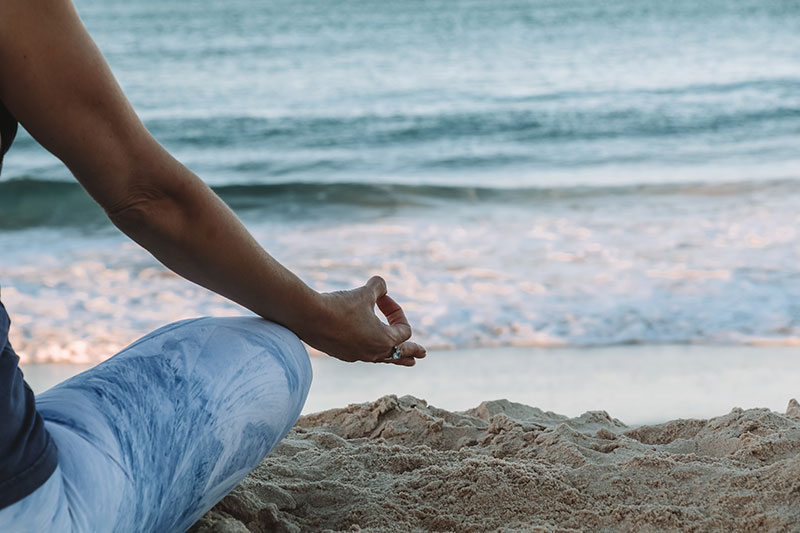If you love yoga, you are probably no stranger to either a soothing or energising cup of tea. Tea and yoga go hand in hand. Even better, one yoga position is ideal for drinking tea. No, it's not the Garudasana. What makes tea and yoga a good match? Let’s find out.
Why tea and yoga are a good match?
Unsweetened pure tea, either herbal or true, is a great healthy substitute for sugary drinks and may offer numerous other benefits. Yoga may do wonders for your well-being too, especially if practiced regularly. Although both tea and yoga are healthy, that's not the only reason why they are a good match. Many yoga practitioners drink tea for relaxation and hydration, but tea and yoga share even a much stronger bond.
 Photo by Chelsea Gates
Photo by Chelsea Gates
1. History
Both tea and yoga have a very long history. It’s believed that the first cup of tea was drunk by the Chinese Emperor Shen Nong about 5000 years ago when a tea leaf accidentally found a way into his cup with boiled water. Around the same time, the first yoga poses took place in India. Although both have a 5000-year-old history, modern tea and modern yoga are not as old. In fact, they have both went through many transitions throughout their lives.
2. Focus, calmness, energy, and immunity
Want to calm your mind and increase focus? Both yoga and tea may provide benefits for mental health. In tea, L-theanine may provide a calming effect, and caffeine may increase alertness. Studies showed that both breathing and meditation in yoga may help improve brain health [1]. Both may help reduce stress hormone cortisol [2], [3] and boost energy and immune system. [4], [5]
3. Spiritual side
Yoga and spirituality are inseparable, and so are the tea and spirituality. While there’s may not be much spiritual awakening in plunging a random tea bag into a cup of hot water (although, the possibility cannot be fully eliminated), loose leaf tea and tea powders are great for tea meditations. In fact, the traditional Japanese tea ceremony with matcha green tea has roots in spirituality, and it’s based on principals of harmony, purity, tranquillity and respect, both between people and nature. Yoga is quite similar and promotes harmony withing oneself and oneself and nature.
4. Benefits
Tea is much more than just a drink, and yoga is much more than just stretching. Depending on which type of tea you choose, you may benefit from improved focus, refreshed mind, enhanced metabolism, increased alertness, or improved calmness. Yoga can do exactly the same. For example, hot yoga and rocket yoga may help improve metabolism and lose weight, meditative yoga may calm the mind, and flow yoga may help you build strength. Match a tea with yoga that may provide the same benefits, and there’s no doubt a reward will follow.
5. Poses
Even though drinking tea while doing the warrior pose may be very challenging, some poses are great for fully enjoying your tea. Meditative Sukhasana or the Easy Pose is perfect for drinking tea. Varjasana or the Diamond Pose is similar to Seiza, a traditional way of sitting in Japan, and a must during Japanese tea ceremony.
Which teas are the best for yoga?
Herbal infusions are usually a tea of choice before and especially after yoga. However, depending on your preferences and whether you are avoiding caffeine, real teas made from Camellia sinensis plant may offer a myriad of benefits. For an evening yoga practice, herbal tea would still be the best choice because it contains no caffeine. All herbal teas will hydrate you, and some may help you relax and promote a healthy sleep too.
If you want the benefits of real teas but want to drink as little caffeine as possible, kukicha, bancha and hojicha may have less caffeine than regular green teas. Raw aged pu’erh may help boost metabolism and usually has less caffeine and more catechins that ripe pu’erh. White Bai Mu Dan is high in antioxidants, and it has a high caffeine content too. A cup before your yoga session may help increase attention and alertness [6]. Silver Needle white tea will be more gentle, lower in caffeine [7] and great for slow meditative brewing. But the best tea for tea meditations is matcha. It’s high in caffeine, high in antioxidants and high in L-theanine, a calming amino acid. This tea is served during Japanese tea ceremony. Many oolong teas such as Buddha Hand and Tie Guan Yin are perfect for slow meditative tea ritual. Besides, you can re-brew them several times.
What is your favorite yoga tea? Share your favorites in the comments below.
Sources:
[1] https://www.ncbi.nlm.nih.gov/pmc/articles/PMC6971819/
[2] https://www.sciencedaily.com/releases/2019/12/191212105851.htm
[3] https://www.nature.com/articles/d41586-019-00398-1
[4] https://www.ncbi.nlm.nih.gov/pmc/articles/PMC3193654/
[5] https://www.ncbi.nlm.nih.gov/pmc/articles/PMC2855614/
[6] https://www.journalijdr.com/effect-white-tea-camellia-sinensis-cognitive-performance



Leave a Reply Cancel Reply